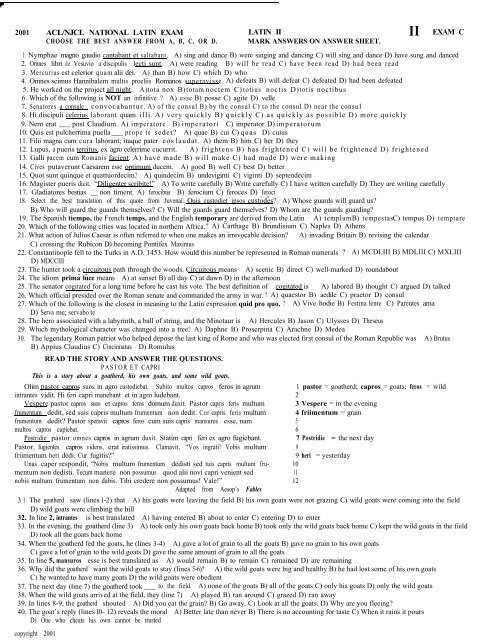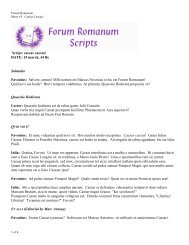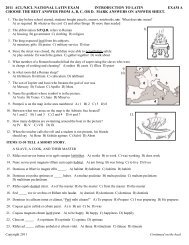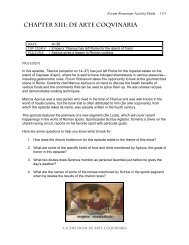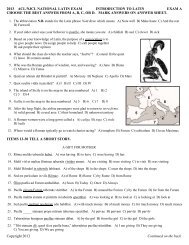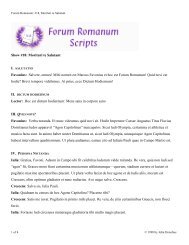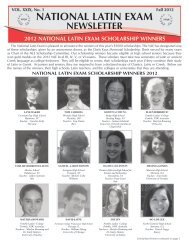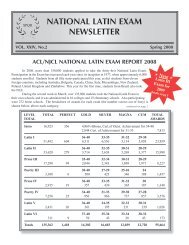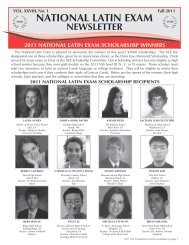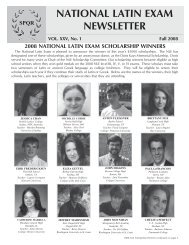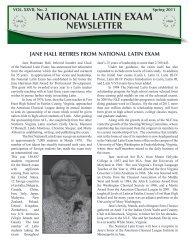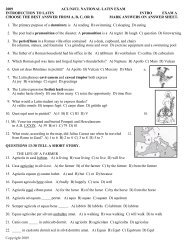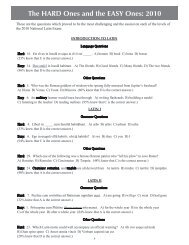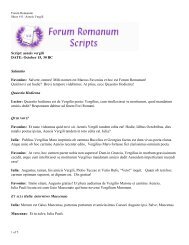2001 ACL/NJCL NATIONAL LATIN EXAM - The National Latin Exam
2001 ACL/NJCL NATIONAL LATIN EXAM - The National Latin Exam
2001 ACL/NJCL NATIONAL LATIN EXAM - The National Latin Exam
You also want an ePaper? Increase the reach of your titles
YUMPU automatically turns print PDFs into web optimized ePapers that Google loves.
<strong>2001</strong> <strong>ACL</strong>/<strong>NJCL</strong> <strong>NATIONAL</strong> <strong>LATIN</strong> <strong>EXAM</strong> <strong>LATIN</strong> II II <strong>EXAM</strong> C<br />
CHOOSE THE BEST ANSWER FROM A, B, C, OR D. MARK ANSWERS ON ANSWER SHEET.<br />
1. Nymphae magno gaudio cantabant et saltabant. A) sing and dance B) were singing and dancing C) will sing and dance D) have sung and danced<br />
2. Omnes libri de Vesuvio a discipulis lecti sunt. A) were reading B) will be read C) have been read D) had been read<br />
3. Mercurius est celerior quam alii dei. A) than B) how C) which D) who<br />
4. Omnes scimus Hannibalem multis proeliis Romanos superavisse. A) defeats B) will defeat C) defeated D) had been defeated<br />
5. He worked on the project all night. A) tota nox B) totam noctem C) totius noctis D) totis noctibus<br />
6. Which of the following is NOT an infinitive ? A) esse B) posse C) agite D) velle<br />
7. Senatores a consule convocabantur. A) of the consul B) by the consul C) to the consul D) near the consul<br />
8. Hi discipuli celerius laborant quam illi. A) very quickly B) quickly C) as quickly as possible D) more quickly<br />
9. Nero erat _ post Claudium. A) imperatore B) imperatori C) imperator D) imperatorum<br />
10. Quis est pulcherrima puella _ prope te sedet? A) quae B) cui C) quas D) cuius<br />
11. Filii magna cum cura laborant; itaque pater eos laudat. A) them B) him C) her D) they<br />
12. Lupus, a pueris territus, ex agro celerrime cucurrit. A) frightens B) has frightened C) will be frightened D) frightened<br />
13. Galli pacem cum Romanis facient. A) have made B) will make C) had made D) were making<br />
14. Cives putaverunt Caesarem esse optimum ducem. A) good B) well C) best D) better<br />
15. Quot sunt quinque et quattuordecim.? A) quindecim B) undeviginti C) viginti D) septendecim<br />
16. Magister pueris dicit, “Diligenter scribite!” A) To write carefully B) Write carefully C) I have written carefully D) <strong>The</strong>y are writing carefully<br />
17. Gladiatores bestias __ non timent. A) ferocibus B) ferocium C) feroces D) feroci<br />
- -<br />
18. Select the best translation of this quote from Juvenal: Quis<br />
custodiet ipsos custodes? A) Whose guards will guard us?<br />
B) Who will guard the guards themselves? C) Will the guards guard themselves? D) Whom are the guards guarding?<br />
19. <strong>The</strong> Spanish tiempo, the French temps, and the English temporary are derived from the <strong>Latin</strong> A) templum B) tempestas C) tempus D) temptare<br />
20. Which of the following cities was located in northern Africa. ? A) Carthage B) Brundisium C) Naples D) Athens<br />
21. What action of Julius Caesar is often referred to when one makes an irrevocable decision?<br />
C) crossing the Rubicon D) becoming Pontifex Maximus<br />
A) invading Britain B) revising the calendar<br />
22. Constantinople fell to the Turks in A.D. 1453. How would this number be represented in Roman numerals ?<br />
D) MDCCIII<br />
A) MCDLIII B) MDLIII C) MXLIII<br />
23. <strong>The</strong> hunter took a circuitous path through the woods. Circuitous means A) scenic B) direct C) well-marked D) roundabout<br />
- -<br />
24. <strong>The</strong> idiom prima luce means A) at sunset B) all day C) at dawn D) in the afternoon<br />
25. <strong>The</strong> senator cogitated for a long time before he cast his vote. <strong>The</strong> best definition of cogitated is A) labored B) thought C) argued D) talked<br />
26. Which official presided over the Roman senate and commanded the army in war. ? A) quaestor B) aedile C) praetor D) consul<br />
27. Which of the following is the closest in meaning to the <strong>Latin</strong> expression quid pro quo. ?<br />
D) Serva me; servabo te<br />
A) Vive hodie B) Festina lente C) Parentes ama<br />
28. <strong>The</strong> hero associated with a labyrinth, a ball of string, and the Minotaur is A) Hercules B) Jason C) Ulysses D) <strong>The</strong>seus<br />
29. Which mythological character was changed into a tree.? A) Daphne B) Proserpina C) Arachne D) Medea<br />
30. <strong>The</strong> legendary Roman patriot who helped depose the last king of Rome and who was elected first consul of the Roman Republic was A) Brutus<br />
B) Appius Claudius C) Cincinnatus D) Romulus<br />
READ THE STORY AND ANSWER THE QUESTIONS.<br />
PASTOR ET CAPRI<br />
This is a story about a goatherd, his own goats, and some wild goats.<br />
Olim pastor capros suos in agro custodiebat. Subito multos capros feros in agrum 1 pastor = goatherd; capros = goats; feros = wild<br />
intrantes vidit. Hi feri capri manebant et in agro ludebant. 2<br />
Vespere pastor capros suos et capros feros domum duxit. Pastor capris feris multum 3 Vespere = in the evening<br />
frumentum dedit, sed suis capris multum frumentum non dedit. Cur capris feris multum 4 friimentum = grain<br />
frumentum dedit? Pastor speravit capros feros cum suis capris mansuros esse, nam 5<br />
multos capros cupiebat. 6<br />
Postridie pastor omnes capros in agrum duxit. Statim capri feri ex agro fugiebant. 7 Postridie = the next day<br />
Pastor, fugientes capros videns, erat iratissimus. Clamavit, “Vos ingrati! Vobis multum 8<br />
friimentum heri dedi. Cur fugitis?” 9 heri = yesterday<br />
Unus caper respondit, “Nobis multum frumentum dedisti sed tuis capris multum fru- 10<br />
mentum non dedisti. Tecum manere non possumus quod alii novi capri venient sed 11<br />
nobis multum frumentum non dabis. Tibi credere non possumus! Vale!” 12<br />
Adapted from Aesop’s Fables<br />
3 1 <strong>The</strong> goatherd saw (lines l-2) that A) his goats were leaving the field B) his own goats were not grazing C) wild goats were coming into the field<br />
D) wild goats were climbing the hill<br />
32. In line 2, intrantes is best translated A) having entered B) about to enter C) entering D) to enter<br />
33. In the evening, the goatherd (line 3) A) took only his own goats back home B) took only the wild goats back home C) kept the wild goats in the field<br />
D) took all the goats back home<br />
34. When the goatherd fed the goats, he (lines 3-4) A) gave a lot of grain to all the goats B) gave no grain to his own goats<br />
C) gave a lot of grain to the wild goats D) gave the same amount of grain to all the goats<br />
35. In line 5, mansuros esse is best translated as A) would remain B) to remain C) remained D) are remaining<br />
36. Why did the goatherd want the wild goats to stay (lines 5-6)? A) the wild goats were big and healthy B) he had lost some of his own goats<br />
C) he wanted to have many goats D) the wild goats were obedient<br />
37. <strong>The</strong> next day (line 7) the goatherd took _ to the field. A) none of the goats B) all of the goats C) only his goats D) only the wild goats<br />
38. When the wild goats arrived at the field, they (line 7) A) played B) ran around C) grazed D) ran away<br />
39. In lines 8-9, the goatherd shouted A) Did you eat the grain? B) Go away. C) Look at all the goats. D) Why are you fleeing?<br />
40. <strong>The</strong> goat’s reply (lines l0- 12) reveals the moral A) Better late than never B) <strong>The</strong>re is no accounting for taste C) When it rains it pours<br />
D) One who cheats his own cannot be trusted<br />
copyright <strong>2001</strong>


